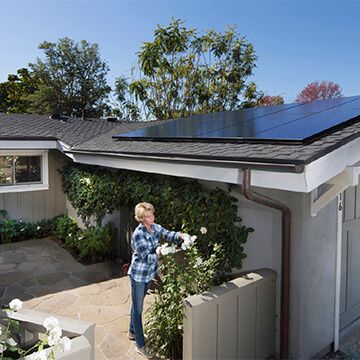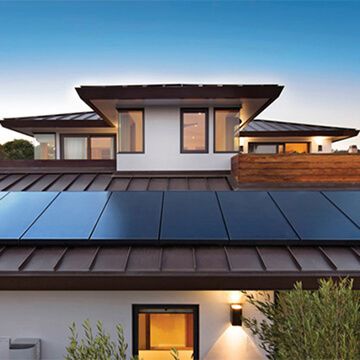Renewable energy is the key to Australia’s electrification plan. Mini-grids with the capacity of 10-500 KW are playing an increasingly important role. When it comes to daily usage of electricity, the solar rooftop is the best option to install all over Australia. Because solar rooftop can be easily transported all over the country even to those outskirts areas, which don’t have much population and proper transport facility yet, these solar rooftop systems require minimal maintenance.

25-year solar panel warranty
Amecco residential and commercial solar panels are backed by the industry-leading 25-year coverage of the amecco Complete Confidence Panel Warranty*. So you can rest easy while you reduce or even eliminate your electric bill

Leading durability
Solar experts know amecco panels are the best at withstanding all types of weather. Whether you live in a mild climate or more extreme conditions, amecco solar cell technology can take it.
What is Solar Rooftop System?
Solar rooftop, which is often called a rooftop Photo-Voltaic power station or PV system, is a photo-voltaic system that has its electric generating solar rooftop panels mounted on the rooftop of residential or commercial buildings or structure. Solar rooftop systems on residential buildings typically feature a capacity of about 5-20 KW, and in cases of those solar rooftop panels mounted on commercial buildings, often reach 100KW or more.
Types of Solar Systems:There are three kinds of solar systems that can be considered:
On-grid Solar System: This on-grid solar system is integrated with the main grid supply. This most straightforward kind of solar rooftop only integrates with grid power and has no other back-up power sources. This is known as an on-grid solar system because this solar system is always in sync with the grid. This on-grid solar system is recommended for those organizations or residential places, which have a guaranteed supply of on-grid power because if you suffer from frequent power interruption as such, a plant won’t work if the grid doesn’t work. This solar system allows power to be used from the grid supply only when the solar rooftop system is unable to supply the required power. Thus eventually, the solar rooftop saves the expenses of non-stop grid power. And this solar rooftop system can earn revenues as any excess electricity generated gets accumulated in the grid for future purposes.
Off-grid Solar System: This kind of solar system is not integrated with any grid power; instead, this solar system only integrates with batteries. The electricity generates from the solar panels charges the battery, which can be used to power various applications later. This kind of solar system is recommended in such locations that are not connected to the grid at all. This type of solar system is perfect for small loads or where power through grid is not connected.
Hybrid Solar System: This kind of solar system can be integrated with grid power, batteries, and diesel generators. The main advantage is if the electricity that generates from the solar system charges the battery, the excess power accumulates in the grid as revenues. Hybrid solar systems are recommended for those energy consumers who have grid power but with frequent interruptions and who need critical loads to be powered continuously. Most industrial and commercial consumers in fall under this hybrid solar system.
Net Metering: Net metering, which is also known as the billing system, credits the owner of the solar system’s owner for feeding the excess energy to the grid. For example, if a house has a solar rooftop system or a PV system that has the ability to generate more electricity than the home uses during daylight hours. If the house were net-metered, then the electricity meter would run backward to provide the house owner with the credits.
Facts one should know about installing Solar Panels:
1. First of all, make sure that you have enough space in your roof or land for installing the solar panels. Otherwise, you won’t get satisfactory returns you expect on your investment.
2. Think if you have a sun-lit area with minimum shade because solar systems require direct sunlight to generate electricity.
3. Make sure if your roof is not damaged or needs to get repaired soon before installation. Otherwise, it won’t be the best idea to install solar rooftop panels.
4. Installing solar rooftop panels will increase the weight on the structure of your rooftop. If the weight of the solar rooftop panels is too much for the construction, then there’s a considerable chance that it will collapse. That will be dangerous for many reasons, not to mention costly. So get proper information about how much weight your rooftop can handle before installing the solar rooftop system.
5. The life of our solar panel is 25 years. Solar panels don’t have any moving parts or electronics and no requirements for maintenance throughout its life 25 years or so—all it needs to wash panels once or twice a year. And the most important thing, you need to keep in mind that you have to choose the best and reliable certified suppliers. And don’t forget to ask for the warranty certificate. And at Ameccowe try our best to satisfy all of our customers by fulfilling all of their requirements.
Benefits of Installing Solar Rooftop Panels:
1. The increase of Carbon Dioxide and Carbon Mono Oxide is causing an alarming situation in the world called “Global Warming.” These solar rooftop systems don’t produce greenhouse gases such as CO2 and CO. From recent research studies, and we got to know that this solar energy can eliminate the carbon emissions by 258 million metric tons if they are extensively used over the next twenty years.
2. Solar rooftop panels don’t just power the AC on exhausting hot summer days, but also they take over some of the AC’s functions themselves. In the research work of the University of California at San Diego, which says solar rooftop panels not only produce emissions-free electricity but also cool down the roof and the building they are attached to. It lowers cooling costs and also offers an extra advantage of being solar.
3. Solar rooftop system installation offers cost savings because the tariff rate of solar rooftop panels is cheaper than commercial and traditional tariff rates. Solar rooftop installation also reduces electricity bills because rooftop solar panels supply electricity to the building, so they need to buy less electricity from the grid, and the net metering allows you to sell your excess power to the utility company for even lower energy bills.
4. Though the deficiency of electricity is very minimal still several rural areas have such interrupted and unreliable connection of grid electricity. So they are forced to use diesel generator, which causes adverse effects on health and air pollution. So, rooftop solar panels are the perfect and affordable choice in this scenario. Since solar rooftop panels use the sun as their source of energy, so they are eco-friendly, and their cost of operation is also stable.
5. One of the most significant advantages of installing the solar rooftop system is, it doesn’t require additional area or space for installation. So one can efficiently utilize the space of their rooftops. Furthermore, the solar rooftop panels offer protection to the roof of the building on which they are installed.
6. Solar panels utilize sunlight to generate electricity, and Australia is an ideal geographical place and receives ample of tropical sunlight. There are almost 300 sunny days with clear skies each year in Australia. So we can say that Australia is an ideal place to install a solar rooftop system.
7. One of the main factors that highlight the importance of solar rooftop panels is that they require minimal maintenance. They come up with a service life of 25 years, and all they need is to clean those solar rooftop panels ideally twice a year.
